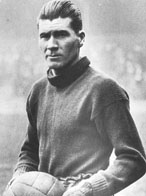Elisha Scott
 |
|||
| Personal information | |||
|---|---|---|---|
| Full name | Elisha Scott | ||
| Date of birth | 24 August 1893 | ||
| Place of birth | Belfast, Ireland | ||
| Date of death | 16 May 1959 (aged 65) | ||
| Place of death | Belfast, Northern Ireland | ||
| Playing position | Goalkeeper | ||
| Youth career | |||
| 1909 | Belfast Boys' Brigade | ||
| Senior career* | |||
| Years | Team | Apps | (Gls) |
| 1911–1912 | Broadway United | ||
| 1911 | Linfield | ||
| 1912–1915 | Liverpool | 28 | (0) |
| 1915–1916 | Belfast United | ||
| 1916 | Linfield | ||
| 1916–1919 | Belfast Celtic | ||
| 1919–1934 | Liverpool | 402 | (0) |
| 1934–1936 | Belfast Celtic | ||
| Total | 430 | (0) | |
| National team | |||
| 1920–1936 | Ireland (IFA) | 31 | (0) |
| 1935 | Irish League XI | 2 | (0) |
| Teams managed | |||
| 1934–1949 | Belfast Celtic | ||
| * Senior club appearances and goals counted for the domestic league only. |
|||
Elisha Scott (24 August 1893 – 16 May 1959) was an Irish football goalkeeper who most notably played for Liverpool from 1912 to 1934 (still holding the record as their longest-serving player).
Elisha Scott played for Linfield and Broadway United before Liverpool manager Tom Watson signed him on a Sunday morning at 10 am 1 September 1912, following a recommendation from Scott's older brother Billy Scott. Liverpool only got the chance to sign Scott when Everton decided that the 19-year-old Elisha was too young.
Scott was reported as signed by Crewe Alexandra in August 1913, presumably under some sort of loan arrangement. He succeeded Thomas Charles Allison as deputy for the first choice keeper, Arthur Box and played for them in the early part of season 1913/14.
Scott finally made his Liverpool debut on New Year's Day 1913 at St James' Park. The team drew 0–0 with Newcastle.
During the early days of his career Scott was understudy to Ken Campbell and only appeared occasionally. The First World War interrupted Scott's career for four years. However, after its conclusion he returned to Liverpool and was determined to make the number 1 jersey his own. Scott finally got a chance of a run in the Liverpool goal at the end of the season. Scott's goalkeeping position was set in stone when Campbell was allowed to leave in the April 1920. Scott established himself as Liverpool's number 1. He was a major part of the back-to-back Championship winning teams of 1922 and 1923, missing just 3 games of the first title and none in the second.
Numerous stories about Scott exist in Liverpool folklore. One such story relates to a 1924 game, after Scott had just made a phenomenal save at Ewood Park against Blackburn. A man appeared from the crowd went over to Scott and kissed him. Scott was part of one of the legendary rivalries of the day along with Everton's Dixie Dean. The two of them were the main topic of discussion when derby day was approaching – Everton declared that Dean would score whilst Liverpool disagreed, saying Scott wouldn't let a single shot past. A famous story, possibly apocryphal, associated with the two men was that of how they once encountered each other in Belfast city centre the day before an Ireland versus England game. Dean, famed for his remarkable heading ability touched his hat and nodded to Scott as they were about to pass only for Scott to respond by diving as if to try to save an imaginary header, much to the initial shock and then delight of the locals who witnessed it while a mildly shocked Dean smiled and quietly continued on his walk.
...
Wikipedia
